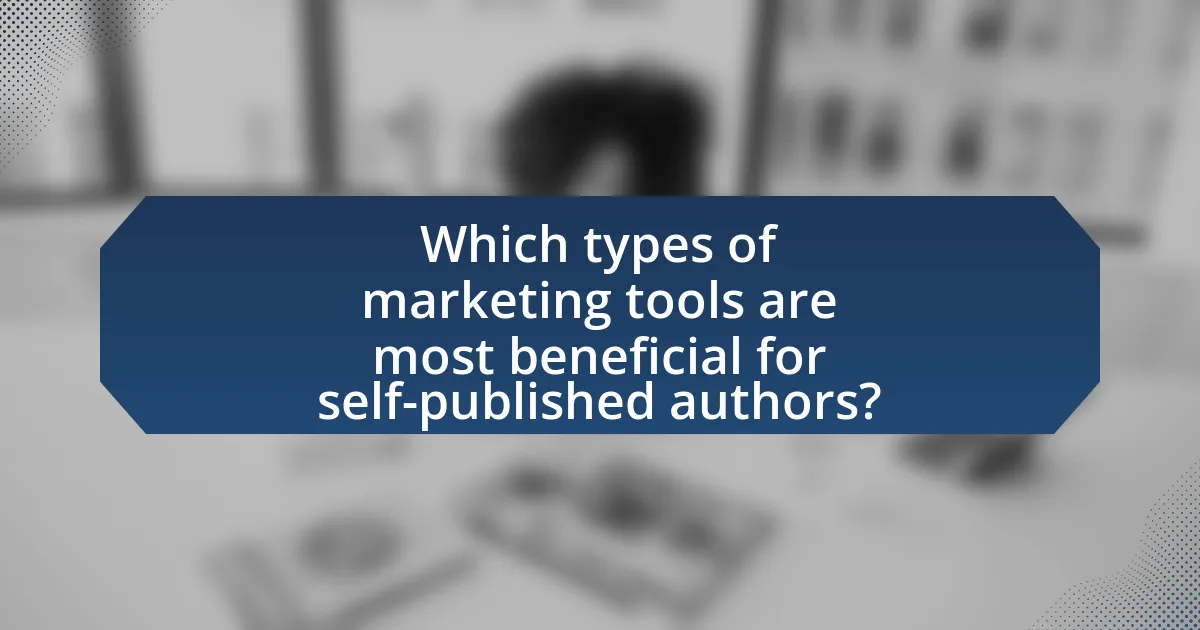The article focuses on essential marketing tools for self-published authors, highlighting the importance of social media platforms, email marketing services, author websites, and online advertising in enhancing visibility and sales. It discusses how these tools improve marketing strategies through data-driven insights, audience engagement, and automation. Key features to look for in marketing tools include analytics, social media integration, and user-friendly interfaces. The article also addresses the challenges authors face without these tools and provides practical tips for effective marketing, emphasizing the need for authors to measure their marketing performance through various metrics.

What are the essential marketing tools for self-published authors?
The essential marketing tools for self-published authors include social media platforms, email marketing services, author websites, and online advertising. Social media platforms like Facebook, Twitter, and Instagram allow authors to engage with readers and promote their work effectively. Email marketing services, such as Mailchimp, enable authors to build a mailing list and communicate directly with their audience, fostering a loyal reader base. An author website serves as a central hub for showcasing books, sharing updates, and providing contact information. Online advertising through platforms like Amazon Ads or Facebook Ads can target specific demographics, increasing visibility and sales. These tools collectively enhance an author’s marketing strategy, leading to greater reach and potential success in the competitive publishing landscape.
How do these tools enhance an author’s marketing strategy?
Marketing tools enhance an author’s marketing strategy by providing data-driven insights, automating promotional efforts, and facilitating audience engagement. These tools enable authors to analyze reader demographics and preferences, allowing for targeted marketing campaigns that increase visibility and sales. For instance, social media management tools help authors schedule posts and track engagement metrics, leading to more effective outreach. Additionally, email marketing platforms allow authors to build and maintain a subscriber list, fostering direct communication with readers and promoting new releases. According to a study by the Content Marketing Institute, 70% of marketers actively invest in content marketing tools, which underscores their importance in driving successful marketing strategies.
What specific features should authors look for in marketing tools?
Authors should look for marketing tools that offer analytics, social media integration, email marketing capabilities, and user-friendly interfaces. Analytics features allow authors to track engagement and conversion rates, which are crucial for assessing the effectiveness of marketing strategies. Social media integration enables seamless sharing of content across platforms, increasing visibility and reach. Email marketing capabilities facilitate direct communication with readers, fostering relationships and promoting new releases. A user-friendly interface ensures that authors can navigate the tool efficiently, minimizing the learning curve and maximizing productivity. These features collectively enhance an author’s ability to effectively market their work and engage with their audience.
How do these features contribute to effective marketing?
The features of marketing tools for self-published authors contribute to effective marketing by enhancing visibility, streamlining communication, and facilitating audience engagement. These tools, such as social media platforms, email marketing services, and analytics software, allow authors to reach a broader audience, tailor their messaging, and track the effectiveness of their campaigns. For instance, social media platforms enable authors to share content and interact with readers in real-time, which can lead to increased book sales and brand loyalty. Additionally, email marketing services provide authors with the ability to segment their audience and send personalized messages, resulting in higher open and conversion rates. Analytics software further supports effective marketing by offering insights into reader behavior and preferences, allowing authors to refine their strategies based on data-driven decisions.
Why is it important for self-published authors to utilize marketing tools?
Self-published authors must utilize marketing tools to effectively reach their target audience and increase book sales. Without these tools, authors may struggle to gain visibility in a saturated market, where over 1 million books are self-published annually. Marketing tools such as social media platforms, email marketing, and online advertising enable authors to promote their work, engage with readers, and build a brand presence. Research indicates that authors who actively market their books can see a significant increase in sales, with some reporting up to a 300% rise in visibility and sales through targeted marketing efforts.
What challenges do self-published authors face without these tools?
Self-published authors face significant challenges without marketing tools, including limited visibility, ineffective audience targeting, and inadequate promotional strategies. Without these tools, authors struggle to reach potential readers, resulting in lower sales and reduced market presence. For instance, a study by the Alliance of Independent Authors found that authors who utilize marketing tools see a 30% increase in book sales compared to those who do not. Additionally, the lack of analytics tools prevents authors from understanding their audience’s preferences, hindering their ability to tailor marketing efforts effectively.
How can marketing tools help overcome these challenges?
Marketing tools can help self-published authors overcome challenges by streamlining their promotional efforts and enhancing audience engagement. These tools, such as social media management platforms, email marketing services, and analytics software, enable authors to efficiently reach their target audience, track engagement metrics, and optimize their marketing strategies. For instance, a study by HubSpot found that businesses using marketing automation see a 451% increase in qualified leads, demonstrating the effectiveness of these tools in driving results. By leveraging marketing tools, self-published authors can effectively navigate the complexities of book promotion and improve their chances of success in a competitive market.

Which types of marketing tools are most beneficial for self-published authors?
Self-published authors benefit most from social media marketing tools, email marketing platforms, and book promotion services. Social media marketing tools like Facebook, Instagram, and Twitter allow authors to engage directly with their audience, build a following, and promote their work effectively. Email marketing platforms such as Mailchimp or ConvertKit enable authors to create newsletters, share updates, and maintain communication with readers, which is crucial for building a loyal fan base. Additionally, book promotion services like BookBub and Goodreads help authors reach wider audiences through targeted advertising and reader recommendations, significantly increasing visibility and sales. These tools collectively enhance an author’s marketing strategy by leveraging direct engagement, personalized communication, and targeted outreach.
What role do social media platforms play in an author’s marketing toolkit?
Social media platforms serve as essential tools in an author’s marketing toolkit by facilitating direct engagement with readers and enhancing visibility. These platforms allow authors to share content, promote their work, and build a community around their brand. For instance, according to a survey by the Author Marketing Club, 80% of authors reported that social media significantly increased their book sales. Additionally, platforms like Facebook and Instagram provide targeted advertising options, enabling authors to reach specific demographics effectively. This targeted approach can lead to higher conversion rates, as authors can tailor their messages to resonate with potential readers.
How can authors effectively use social media for promotion?
Authors can effectively use social media for promotion by creating engaging content that resonates with their target audience. This involves sharing snippets of their work, behind-the-scenes insights, and personal stories to build a connection with readers. According to a 2021 survey by the Author Marketing Club, 70% of authors reported that social media significantly increased their book sales, highlighting its effectiveness as a promotional tool. Additionally, authors should utilize platforms like Instagram and Twitter to interact with followers, participate in relevant hashtags, and collaborate with other authors or influencers to expand their reach.
What are the best practices for engaging with readers on social media?
The best practices for engaging with readers on social media include responding promptly to comments, sharing user-generated content, and creating interactive posts. Engaging promptly shows readers that their input is valued, fostering a sense of community. Sharing user-generated content not only acknowledges readers but also encourages others to participate, enhancing engagement. Creating interactive posts, such as polls or questions, invites readers to share their opinions and experiences, further increasing interaction. According to a study by Sprout Social, brands that respond to comments can see a 20-40% increase in engagement rates, validating the effectiveness of these practices.
What are the advantages of using email marketing tools?
Email marketing tools provide several advantages, including enhanced targeting, automation, and measurable results. These tools allow marketers to segment their audience based on specific criteria, ensuring that messages are relevant and personalized, which can lead to higher engagement rates. Automation features enable the scheduling of campaigns and follow-ups, saving time and ensuring consistent communication. Additionally, email marketing tools offer analytics that track open rates, click-through rates, and conversions, allowing authors to assess the effectiveness of their campaigns and make data-driven decisions. According to a study by the Direct Marketing Association, email marketing has an average return on investment of $42 for every dollar spent, highlighting its effectiveness as a marketing strategy.
How can authors build and maintain an email list?
Authors can build and maintain an email list by offering valuable content in exchange for subscribers’ email addresses. This can be achieved through lead magnets such as free eBooks, exclusive content, or newsletters that provide insights into the writing process or upcoming releases.
To maintain the list, authors should regularly engage with subscribers through consistent communication, such as sending updates, personalized messages, and relevant offers. According to a study by the Direct Marketing Association, email marketing has an average return on investment of 42:1, highlighting the effectiveness of maintaining an active email list for authors.
What types of content should authors send to their email subscribers?
Authors should send a variety of content types to their email subscribers, including updates on new book releases, exclusive excerpts, behind-the-scenes insights, writing tips, and promotional offers. These content types engage subscribers and foster a sense of community. For instance, sending updates on new releases keeps readers informed and excited, while exclusive excerpts can entice them to purchase the book. Behind-the-scenes insights provide a personal touch, making readers feel connected to the author. Writing tips can establish the author as an authority in their genre, and promotional offers can incentivize purchases. This approach not only maintains subscriber interest but also enhances the likelihood of book sales.

How can self-published authors measure the effectiveness of their marketing tools?
Self-published authors can measure the effectiveness of their marketing tools by analyzing key performance indicators (KPIs) such as sales data, website traffic, and engagement metrics. For instance, tracking sales before and after a marketing campaign can reveal its direct impact on revenue. Additionally, using tools like Google Analytics allows authors to monitor website visits and user behavior, providing insights into which marketing strategies drive traffic. Engagement metrics on social media platforms, such as likes, shares, and comments, can also indicate how well marketing content resonates with the audience. By systematically evaluating these metrics, authors can determine the success of their marketing efforts and make informed adjustments to improve future campaigns.
What metrics should authors track to evaluate their marketing efforts?
Authors should track metrics such as book sales, website traffic, social media engagement, email open rates, and conversion rates to evaluate their marketing efforts. Tracking book sales provides direct insight into the effectiveness of marketing campaigns, while website traffic indicates the reach and interest generated by promotional activities. Social media engagement metrics, including likes, shares, and comments, reflect audience interaction and brand awareness. Email open rates measure the effectiveness of email marketing strategies, and conversion rates show how many leads are turned into sales, providing a clear picture of overall marketing success. These metrics collectively offer a comprehensive view of an author’s marketing performance and areas for improvement.
How can authors use analytics to improve their marketing strategies?
Authors can use analytics to improve their marketing strategies by analyzing reader engagement data to tailor their promotional efforts. By utilizing tools like Google Analytics, authors can track website traffic, identify which marketing channels drive the most visitors, and understand reader demographics. This data allows authors to refine their target audience, optimize content for better engagement, and allocate marketing resources more effectively. For instance, a study by HubSpot found that businesses using analytics to inform their marketing strategies saw a 20% increase in ROI. This demonstrates that leveraging analytics can lead to more effective marketing campaigns for authors.
What tools are available for tracking marketing performance?
Tools available for tracking marketing performance include Google Analytics, HubSpot, SEMrush, and Hootsuite. Google Analytics provides insights into website traffic and user behavior, allowing marketers to assess the effectiveness of their campaigns. HubSpot offers comprehensive marketing analytics, including email performance and lead tracking. SEMrush specializes in SEO and PPC performance tracking, providing data on keyword rankings and ad effectiveness. Hootsuite enables social media performance tracking, allowing users to analyze engagement metrics across various platforms. These tools are widely recognized for their ability to deliver actionable insights that enhance marketing strategies.
What are some common pitfalls to avoid when using marketing tools?
Common pitfalls to avoid when using marketing tools include neglecting to define clear goals, failing to analyze data effectively, and over-relying on automation. Defining clear goals is essential because without specific objectives, marketing efforts can become unfocused and ineffective. For instance, a study by HubSpot found that companies with documented marketing strategies are 313% more likely to report success. Additionally, failing to analyze data can lead to missed opportunities for optimization; according to a report by McKinsey, data-driven organizations are 23 times more likely to acquire customers. Lastly, over-relying on automation can result in a lack of personal touch, which is crucial for engaging audiences; research indicates that personalized marketing can increase conversion rates by up to 202%.
How can authors ensure they are using tools effectively?
Authors can ensure they are using tools effectively by selecting tools that align with their specific marketing goals and regularly assessing their performance. For instance, utilizing analytics tools to track engagement metrics allows authors to understand which marketing strategies yield the best results. Research indicates that authors who adapt their tool usage based on data insights can increase their audience reach by up to 30%. Additionally, participating in training sessions or webinars on tool functionalities can enhance authors’ proficiency, leading to more effective marketing campaigns.
What strategies can help authors avoid wasting resources on ineffective tools?
Authors can avoid wasting resources on ineffective tools by conducting thorough research and utilizing trial periods before committing to any marketing tool. Researching user reviews, expert opinions, and case studies can provide insights into the effectiveness of tools. For instance, a survey by the Content Marketing Institute found that 70% of marketers prioritize tools based on peer recommendations and proven results. Additionally, many software providers offer free trials, allowing authors to assess functionality and suitability without financial commitment. This approach minimizes the risk of investing in tools that do not meet their specific needs.
What practical tips can self-published authors implement for successful marketing?
Self-published authors can implement several practical tips for successful marketing, including building an author platform, utilizing social media, and engaging in email marketing. Establishing an author platform, such as a personal website or blog, allows authors to showcase their work and connect with readers directly. Social media platforms like Facebook, Twitter, and Instagram enable authors to reach a broader audience and interact with potential readers, which is crucial since 73% of marketers believe that social media marketing has been effective for their business. Email marketing is another effective strategy; according to the Direct Marketing Association, email marketing has an average return on investment of $42 for every dollar spent, making it a cost-effective way to promote new releases and engage with a dedicated reader base.





